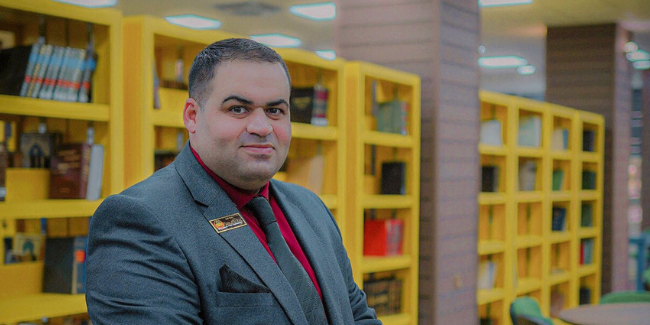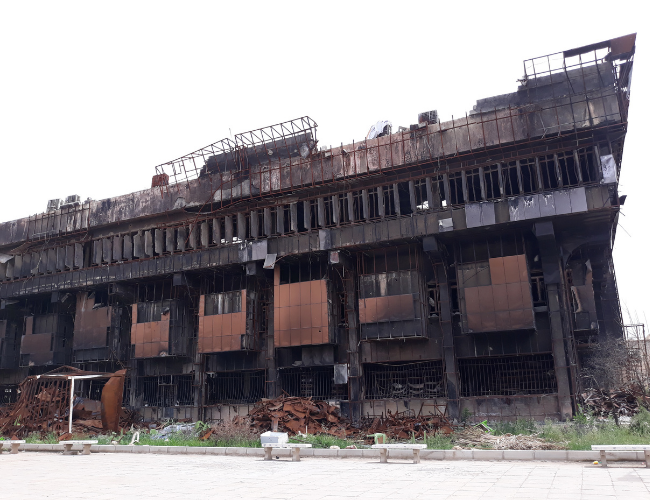
By Rob Green, Editor, Information Professional
4 May 2022
CILIP Conference and Expo is taking place in Liverpool on 7 and 8 July, and here Rob Green speaks to keynote speaker Sayf Al Ashqar, Director of the Central Library at the University of Mosul, about how the library has literally risen
from the ashes.
MOSUL is Iraq’s second largest city after Baghdad. Situated on the Tigris River, close to the northern border with Syria and Turkey, it has a population of some 1.6 million people. Settlements in the area can be traced back thousands of
years, and it grew to be one of the most important cities in the region, coveted by dynasties over the ensuing centuries before becoming part of Iraq in 1918 at the end of First World War.
In 1932 Iraq gained its independence and was ruled by the Hashemite Monarchy, which lasted until 1958. Two decades of civilian and military rule followed, and it was during this period, in 1967, that the library was built – opening up
new opportunities to support the university (which was founded in 1921) and education in the region.
In 1979 Saddam Hussain gained control of Iraq, and it was under his regime that a US-led coalition entered the country in a bid to unseat him as Iraq’s President. Despite US President George W. Bush claiming a military victory in 2004,
Iraqi people faced continued attacks from insurgents in the country and instability in the region led to the creation of ISIS (The Islamic State of Iraq and Syria). This group was to lay siege to Mosul in 2014, and after six days of
fighting it gained control of the city.
Around half a million people fled Mosul, but for those who could not escape Mosul became a brutal and unforgiving place.
Fighting began on 4 June, 2014 and by 10 June ISIS fighters had entered the city and they quickly tried to stamp their authority on the city. One of their first targets was the university and its library, which was looted and eventually
burnt to the ground.
Library Director Sayf Al Ashqar says the attack on the library was a clear signal from ISIS – against freedoms and against education. He says: “I was aware that they would target everything that contradicts their terrorist thinking, and
I was very shocked by their terrorism, they are inhumane.”
That inhumanity was felt first-hand by Sayf and his family when his father, an academic in Mosul, was murdered by ISIS fighters. The destruction of the library and cruelty of ISIS, was no surprise after losing a loved one at their hands.
Sayf says: “ISIS is a terrorist group that robbed people’s will, using false beliefs. Raped, killed, burned and destroyed society. In a difficult time, there was no one to support us, and we did not know that they would control the city
so easily from 2014 to 2017 through their possession of weapons and the terrorist organisation.
“The terrorists killed my father, who was an academic, and destroyed my family's house, destroyed the university and burned the library.”

Despite the horrendous oppression and violence, some library staff did what they could to save the collection, as Sayf recalls: “Librarians and staff tried to prevent terrorists from stealing and burning books and resources, but the terrorists
had weapons and were insulting everyone. Some content was saved by taking risks.”
ISIS waged violence against people, attacking institutions and those connected to them. Sayf, like hundreds of thousands of others from Mosul, was lucky enough to find a route out of the city.
He says: “When ISIS took control of Mosul, with difficulty I left Mosul for the city of Dohuk in the Kurdistan region of Iraq. As a civilian, I must use my intellectual and scientific knowledge to fight terrorism.”
To that end, “alternative locations were established for the University of Mosul, and I was working on a daily basis in the main alternative location of the university to provide services and to clarify our difficult situation to obtain
support to fight terrorism.”

It is not hard to understand why Sayf wanted to carry on providing services, despite the fact that “life was very difficult”, when he explains why he wanted to become a librarian in the first place. He says he was inspired to join the
profession by “knowledge, relationship, hope, learning, experience, sharing and understanding”.
In the same year as ISIS entered Mosul, the university library was able to deliver services from its temporary home.
“University of Mosul began providing its services by opening an alternative location in the Kurdistan region of Iraq during a short period of ISIS occupation of the city of Mosul in 2014,” Sayf explains. “To ensure continuity in the same
year, the library restored its services through the alternative location.”
ISIS continued to hold Mosul until 2017, and in July of that year Iraqi troops declared victory following eight months of fighting to regain control of Mosul.
Sayf says that this moment marked the start of the library’s return to the city, although it would take many years before that dream came to fruition. Library staff continued to work at the temporary home in Kurdistan, but at the same
time preparation for a return to Mosul were under way.
Staff and students returned to the university, but more than one million items had been lost or damaged during the occupation of Mosul. While library staff had done their best to save some of the collection, it was an impossible task to
save them all.
Following the liberation of the city, the university library did its best to support students and academics, but without the resources it was not easy.
A campaign, the Mosul Book Bridge, was established to help restore some of the lost books. It brought together academics from Mosul and the UK who set about finding ways to rebuild stock. Book
Aid UK also joined the campaign, helping to coordinate the donations of thousands of books and other resources back on the shelves.
Dr Alaa Hamdon, a lecturer at the University of Mosul, was the founding force behind the campaign and he was joined by Dr Caroline Sandes (International Council on Monuments and Sites, UK); Dr Alice König (Senior Lecturer in Classics,
University of St Andrews, UK) and Ms Kate Walker (Education Consultant and PhD Candidate, University of Sheffield, UK). Over a five-year period, some 50,000 core texts were delivered to the library, thanks to donations and funds raised
through the campaign.
In February of this year, the rebuilt library reopened, marking a dramatic change in fortunes for the library, as well as the city. Sayf says the re-opening demonstrated the commitment of his staff to their students, and the hard work
that everyone put into the project of restoring services.
He adds that when the doors were finally opened, “I felt that who was right, won. Despite our sorrows and pains, we had hope, energy and commitment to the work that contributed to achieving victory.”
*Sayf Al Ashqar will be a keynote speaker at this year’s CILIP Conference and Expo, taking place at Exhibition Centre Liverpool on 7 and 8 July. Early bird tickets are available
for those who book before 27 May.






